
Excertos do catálogo

Issue 1, 26 June 2014 MTX3 868MHz band Narrow Band FM sub-miniature TX The MTX3 transmitter module adds a totally new sub-miniature form factor to the existing range of Radiometrix ISM band devices. Using cutting edge integrated RF devices, it offers multi channel, low power narrowband operation in a previously unobtainable size. It is ideally suited to applications where existing wideband modules have insufficient range and where traditional narrowband modules would physically be too big to fit in. Conforms to EN 300 220-2 and EN 301 489-3 High performance Fractional N (Sigma-Delta) Synthesizer with TCXO Vibration resistant (negligible microphony) Data rates up to 10 kbps for standard module Usable range over 500m (with suitable aerials and matching receiver) Fully screened. Very low profile Feature-rich interface (analogue and digital baseband) Re-programmable via RS232 interface Low power requirements Applications Keyfobs and other hand held terminals Small form factor data loggers Industrial telemetry and telecommand In-building environmental monitoring and control Covert, high-end security devices Unobtrusive fire alarm sensors Heavy vehicle/machinery controls Technical Summary Operating frequency: 869.2125 and 869.2375MHz (Social alarms) (Design will cover 850 - 880MHz) 915MHz band version available Other custom UHF bands 850-950MHz version (MTX3) also available 4 parallel channels (also fully controllable via serial port) Transmit power: +10dBm (10mW) Supply range: 3.1 – 15V (will operate down to 2.9V) Current consumption: 24mA @ 10mW Data bit rate: 10kbps max. (standard module) Serial configuration by inverted RS232 at 3V CMOS level Size: 23 x 12.5 x 7 mm Evaluation platforms: NBEK + matching carrier board
Abrir o catálogo na página 1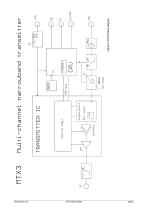
Figure 2: MTX3 block diagram Radiometrix Ltd
Abrir o catálogo na página 2
Figure 3: MTX3 footpint (top view) Function RF output (to antenna) Ground 2.9V – 15V DC power supply (@ 10mW) Transmit Enable (active high) 1 Serial frequency programming / configuration DC coupled input for 3V CMOS logic. Rin=47kΩ Parallel Channel select Parallel Channel select LSB Ground Notes: 1. Serial programming is by the application of a logic level inverted RS232 datastream at 9600 baud to the EN/PGM pin. The unit must be fully enabled (5mS after the rising edge of the EN signal) before a programming burst can be properly decoded. 2. Channel select inputs have pull-ups (50kΩ) to 3V...
Abrir o catálogo na página 3
Condensed specifications Frequency Frequency stability Channel spacing Number of channels Operating temperature Spurious radiations Transmitter Output power Peak deviation TX on switching time Modulation type TX modulation bandwidth Adjacent channel TX power TX spurious Supply Voltage Current Inputs Size Interface User RF Recommended PCB hole size Social alarms: 869.2125 and 869.2375MHz (design will cover 850-880MHz) 915MHz band version available ±1.5kHz 25kHz, 20KHz 4 channels controlled by parallel port, or 256 sequential, or direct control of PLL device via RS232 interface -20 ºC to +70...
Abrir o catálogo na página 4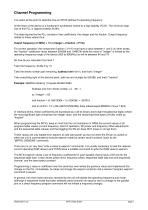
Channel Programming It is useful at this point to describe how an MTX3 defines it's operating frequency: At the heart of the device is a fractional N synthesizer locked to a high stability VCXO. The minimum step size of this PLL is (approximately) 24.8Hz The data required by the PLL consists of two coefficients: the integer and the fraction. Output frequency relates to these values thus: Output frequency (in MHz) = 13 x (integer + (fraction / 2^19)) For correct operation, the component (fraction / 2^19) must have a value between 1 and 2 (in other words, the "fraction" coefficient varies...
Abrir o catálogo na página 5
Operation Modes The MTX3 has three different modes of operation: 1. Parallel. By default the MTX3 operates on one of the four channels selected by the parallel input pins. At power up, or when a change of parallel input is detected, the current frequency coefficients are loaded from the eeprom stores corresponding to parallel channels 0-3. The parallel input consists of an inverted 2 bit binary number applied to P0/P1 (often from a 2 pole switch) 2. Sequential. If a (sequential) channel is programmed over the serial port, the unit sets it's operating frequency according to this channel...
Abrir o catálogo na página 6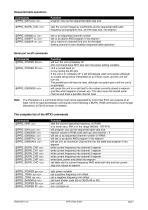
Sequential table operations Commands @PRG_0001zzzz Function program zzzz as the sequential table step size sets the current frequency coefficients as the sequential table start frequency and programs this, and the step size, into eeprom set cc as sequential channel number set cc as above AND program it into eeprom set a maximum channel limit (nn) for the table Setting channel to zero disables sequential table operation Serial port on/off commands Commands @PRG_POWER 00 @PRG_POWER FF Function will turn the unit completely off (this command does NOT also zero the power setting variable) Unit...
Abrir o catálogo na página 7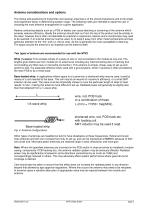
Antenna considerations and options The choice and positioning of transmitter and receiver antennas is of the utmost importance and is the single most significant factor in determining system range. The following notes are intended to assist the user in choosing the most effective arrangement for a given application. Nearby conducting objects such as a PCB or battery can cause detuning or screening of the antenna which severely reduces efficiency. Ideally the antenna should stick out from the top of the product and be entirely in the clear, however this is often not desirable for practical...
Abrir o catálogo na página 8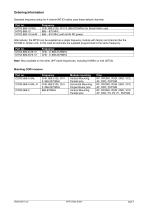
Ordering Information Standard frequency setup for 4 channel MTX3 radios uses these default channels: Part no. MTX3-869-10-SAL MTX3-869-10 MTX3-869-10-5mW Frequency CH0: 869.2125, CH1-3: 869.2375MHz (for Social Alarm use) 868 – 870 MHz 868 – 870 MHz (with 5mW RF power) Alternatively, the MTX3 can be supplied as a single frequency module with factory set channel (like the NTX3B or similar unit). In this case all channels are supplied programmed to the same frequency. Part no. MTX3-869.2125-10 MTX3-869.2375-10 Note: Also available on the other UHF band frequencies, including 915MHz or 433...
Abrir o catálogo na página 9Todos os catálogos e folhetos técnicos Radiometrix
-
LNM2H
13 Páginas
-
NiM1B
13 Páginas
-
VX2M
9 Páginas
-
WRX2C
9 Páginas
-
MSR3
8 Páginas
-
LMR0
10 Páginas
-
SAT3
5 Páginas
-
NTX2B
13 Páginas
-
NTX0
8 Páginas
-
MTX2
10 Páginas
-
BiM3H
8 Páginas
-
QPX1
8 Páginas
-
QPT1
8 Páginas
-
AiM1
9 Páginas
-
Universal Evaluation Kit
27 Páginas
-
TDL2A Evaluation Kit
4 Páginas
-
SPM2/RPM Evaluation Kit
7 Páginas
-
SP2 Evaluation Kit
12 Páginas
-
NBEK Controller As 1200 Baud Modem
7 Páginas
-
Narrow Band Module Evaluation Kit
10 Páginas
-
M48A Application Board
12 Páginas
-
M1144
8 Páginas
-
DXT / DXR
7 Páginas
-
Control44 Evaluation Kit
7 Páginas
-
CTA88 Remote Control Application Boards
16 Páginas
-
CTA28 App. boards
11 Páginas
-
BL118
7 Páginas
-
BD118
5 Páginas
-
PAN1311
2 Páginas
-
PAN1310
2 Páginas
-
m48a
11 Páginas
-
LMR2
11 Páginas
-
TDL3F
10 Páginas
-
krx2
9 Páginas
-
KTX2
8 Páginas
-
RPM3
15 Páginas
-
ENX1
11 Páginas
-
NiM2
11 Páginas
-
BiM1
15 Páginas
-
RX3G
6 Páginas
-
PLR2
12 Páginas
-
MSR3
8 Páginas
-
CXR2
12 Páginas
-
COR3
8 Páginas
-
TX2S
7 Páginas
-
CXT2
12 Páginas
-
KRX2
9 Páginas
-
KFX2
4 Páginas
-
KDEC
5 Páginas
-
TXL2
11 Páginas
-
Radiometrix
20 Páginas
























































































